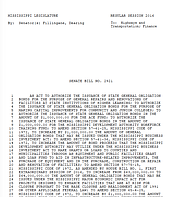Thursday, March 17, 2016
Sen. Michael Watson, R-Pascagoula, presented an amendment to the much-debated bond bill on March 16 that would have eliminated the bill's ability to raise taxes; Watson's amendment failed and Senate Bill 2921 passed to the House today. Photo by Arielle Dreher.
JACKSON — Three hours of heated debate, bi-partisan opposition and five failed amendments later, the last finance bill—to ostensibly fix crumbling highways, bridges and roads—passed the Mississippi Senate by four votes Wednesday. Sen. Willie Simmons, D-Cleveland, chairman of the Highways and Transportation Committee, said Senate Bill 2921 was no more than a “dummy” bond bill, which brings forward several bond and tax code sections in order to address the funding necessary to begin to fix in the state.
“This bill includes the bond code sections and tax code sections that we can look into for fees and taxes—but there is not set amount of fees (in the bill),” Simmons told the House Wednesday. “It is a great vehicle for us to send to the House and continue to discuss our problems with our highways and bridges.”
Sen. Joey Fillingane, R-Sumrall, chairman of the Finance Committee, and Senate President Pro Tempore Terry Burton, R-Newton, both spoke in support of the bill. Burton admitted that the bill was out of the ordinary from how the Senate usually handles bond bills, but said that something needed to be done about the state’s infrastructure problem.
“There’s got to be something done about the highway system,” Burton said. “We’ve got to do something, or it’s going to fall apart.”
The bill has a reverse-repealer in it, which means that if it passes through the House it would go into a conference committee before coming back to the Senate for a final vote. Conference committees are composed of three representatives and three senators, picked by Republican Speaker Philip Gunn and Lt. Gov. Tate Reeves. In order for a bill to successfully leave the committee, four members would need to sign off on it, then the Senate would get to vote on the conference report but not offer amendments to it.
Republicans and Democrats both expressed concerns with the bill on Wednesday, pointing out that gas taxes could be raised as a result of passing the bill—at the will of two senators. The bill brings forward income, franchise, rental car and gasoline tax-code sections, and Simmons said this was done so that the funding for infrastructure is not restricted to one idea. Simmons said he had gone on the record in support of raising the gas tax as a part of funding the state’s infrastructure, but also said this is only his opinion. Sen. Michael Watson, R-Pascagoula, questioned Simmons about the necessity of the bill, pointing to other bond bills that the Senate has already passed.
“If we wanted to spend bond proceeds, could we not include that in the bond package we already passed?” Watson asked Simmons.
Simmons said that they could have included it, but that this bill highlights various components and additional code sections that could be used to raise funding for the state’s infrastructure. Later he told Sen. David Jordan, D-Greenwood, that this bill is the only approach to address the state’s infrastructure in this legislative session.
Both Democrats and Republicans offered amendments to the bill, but none was considered friendly to Sen. Simmons. All five amendments failed, including Sen. Watson and Sen. McDaniel's amendment which would have deleted all code sections in the bill that deal with taxes or fees. Several senators opposed to the bill, spoke against it before it passed.
Sen. Hob Bryan, D-Amory, said the bill was a part of an effort to abolish the corporate franchise tax, and he said Senate Bill 2921 would have a detrimental impact on drivers in the state, especially if the Taxpayer Pay Raise Act passed too.
“If we wanted revenue to fix the roads, all we would have to do is kill the Taxpayer Pay Raise Act—or do nothing, and we’d have more revenue,” he said. “At the end of the day, you’ll have less revenue than you started out with (if both bills pass).”
Bryan said the Taxpayer Pay Raise Act would reduce the state’s general fund by 10 percent by eliminating corporate franchise taxes, while Senate Bill 2161 opened the door to raise taxes for Mississippians.
“I have voted against a number of tax credits or tax cuts because I thought they took money away from things we really needed,” Bryan said. “It is simply not the case that if you vote no on this, you’re voting no on highways … it’s not right to be told that the price of maintaining our highways is to put this bill in conference.”
Sen. Chris McDaniel, R-Ellisville, also spoke against the bill, saying it was regressive to increase the gasoline tax and then conversely phase out the corporate franchise tax. He said the burden would fall on middle-class and poor people in the state. “That’s not fair tax policy,” McDaniel said.
“This bill is like a Trojan horse,” McDaniel said. “And the people of this state are the ones ultimately suffering.”
The bill passed by a vote of 34-13 and needed 30 votes to pass because all revenue bills require a three-fifths majority vote. McDaniel held the bill on a motion to reconsider, but the Senate tabled the motion this morning. The bill will now head to the House for consideration. The Senate also tabled the motion to reconsider on the Taxpayer Pay Raise Act this morning.
For more legislative coverage visit jacksonfreepress.com/msleg.

